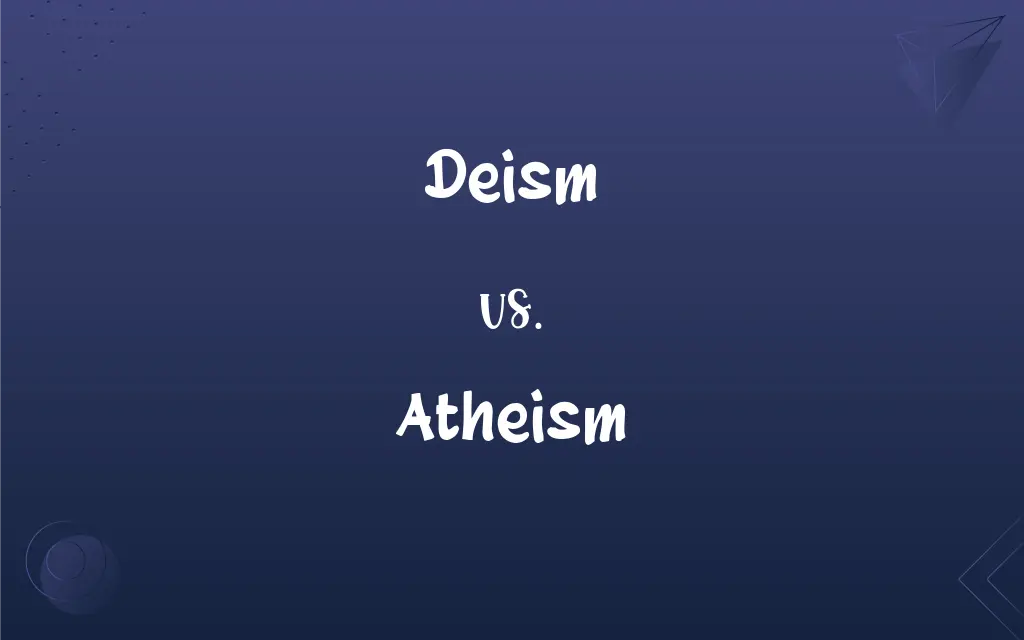Deism vs. Atheism: What's the Difference?
Edited by Aimie Carlson || By Janet White || Updated on October 5, 2023
Deism believes in a creator who doesn't intervene in the universe, whereas atheism denies the existence of any deity or divine intervention.

Key Differences
Deism and atheism are philosophical positions concerning the existence of deities, but they differ fundamentally in their approach and belief. Deism posits the existence of a supreme being or a creator who does not interfere with the natural world or human affairs after the act of creation. It rejects revealed religion, relying instead on reason and observation of the natural world to deduce the existence of a creator. Deists typically reject supernatural events, miracles, and divine revelation as a source of knowledge about the divine.
Atheism, on the other hand, is the lack or absence of belief in the existence of deities. Atheists do not posit the existence of any god, gods, or higher powers and often rely on scientific understanding, evidence, and reason to explain the natural world. Atheism does not propose any alternative origin of the universe; instead, it rejects the theistic assertion of a deity due to the lack of empirical evidence.
The philosophical underpinnings of deism are rooted in the enlightenment era, emphasizing reason, science, and the observable natural world. Deism proposes a detached creator, a ‘watchmaker’ who creates the universe and lets it run according to natural laws without intervention. This concept opposes the theistic approach that involves a personal god who interacts with and intervenes in the world.
Atheism varies in its forms, with some atheists actively denying the existence of gods (strong atheism) and others simply lacking belief in gods without making any positive claim about their non-existence (weak atheism). Atheism is not a belief system or worldview in itself; it is merely the absence of belief in gods and does not necessarily imply adherence to any particular philosophy, moral framework, or worldview.
While deism acknowledges a form of a supreme being or entity responsible for the creation of the universe, atheism completely dismisses such a concept. Deism values reason and empirical observation as a means to understand the creator, and atheism values reason and empirical observation as means to understand the natural world without invoking any supernatural explanation.
ADVERTISEMENT
Comparison Chart
Belief in Deity
Believes in a non-intervening creator.
Denies the existence of any deity.
Philosophical Root
Rooted in enlightenment and values reason and science.
Based on skepticism, empiricism, and naturalism.
View on Revelation
Rejects divine revelation and miracles.
Does not acknowledge divine revelations or miracles.
Moral Source
Morality is discerned through reason.
Morality is subjective and not derived from divine command.
Position Type
Theistic philosophy believing in a deistic god.
Non-theistic stance rejecting belief in gods.
ADVERTISEMENT
Deism and Atheism Definitions
Deism
The belief in a creator who does not intervene in the universe.
Deism was popular among enlightenment thinkers who valued reason over revelation.
Atheism
A stance that denies the existence of any gods or divine entities.
Atheism is not synonymous with immorality or nihilism.
Deism
A philosophy positing a detached ‘watchmaker’ creator.
Deism rejects the notion of a personal god who answers prayers.
Atheism
A philosophical position not accepting theistic beliefs.
Atheism does not propose alternative origins of the universe.
Deism
The belief in a god based on reason and natural law.
Deism does not adhere to any specific religious doctrine or dogma.
Atheism
The absence of belief in the existence of deities.
Atheism relies on empirical evidence and reason.
Deism
A worldview acknowledging a deity but rejecting supernatural events.
Deism emphasizes the importance of scientific observation and rational inquiry.
Atheism
A worldview not including any form of deities or supernatural beings.
Atheism values scientific understanding of the natural world.
Deism
A form of theism asserting a non-intervening god.
Deism was influential in the development of the scientific method.
Atheism
Disbelief in or denial of the existence of God or gods.
Deism
A religious belief holding that God created the universe and established rationally comprehensible moral and natural laws but does not intervene in human affairs through miracles or supernatural revelation.
Atheism
(narrowly) Belief that no deities exist (sometimes including rejection of other religious beliefs).
Deism
A philosophical belief in the existence of a god (or goddess) knowable through human reason; especially, a belief in a creator god unaccompanied by any belief in supernatural phenomena or specific religious doctrines.
Atheism
(broadly) Rejection of belief that any deities exist (with or without a belief that no deities exist).
Deism
Belief in a god who ceased to intervene with existence after acting as the cause of the cosmos.
Atheism
(very broadly) Absence of belief that any deities exist (including absence of the concept of deities).
Deism
The doctrine or creed of a deist; the belief or system of those who acknowledge the existence of one God, but deny revelation.
Atheism
(historical) Absence of belief in a particular deity, pantheon, or religious doctrine (notwithstanding belief in other deities).
Deism
The form of theological rationalism that believes in God on the basis of reason without reference to revelation
Atheism
The disbelief or denial of the existence of a God, or supreme intelligent Being.
Atheism is a ferocious system, that leaves nothing above us to excite awe, nor around us to awaken tenderness.
Atheism and pantheism are often wrongly confounded.
Atheism
Godlessness.
Atheism
The doctrine or belief that there is no God
Atheism
A lack of belief in the existence of God or gods
Atheism
A rejection of belief in gods due to a lack of evidence.
Atheism is not a belief system but a lack of belief in gods.
FAQs
Do deists believe in an afterlife?
Deism does not have a unified stance on an afterlife, and individual beliefs may vary.
Can atheists be spiritual?
Yes, some atheists identify as spiritual and find meaning through non-religious avenues.
Is deism the same as agnosticism?
No, deism believes in a creator, while agnosticism is undecided or unsure about the existence of a deity.
Can atheists have moral values?
Absolutely, atheists can have strong moral values based on empathy, experience, and societal norms.
Do all atheists assert that there is no god?
Not all. Some simply lack belief in gods without making positive assertions about their non-existence.
Can deism be considered a form of theism?
Yes, deism is a form of theism that believes in a non-intervening god.
Is atheism a religion?
No, atheism is not a religion; it is the absence of belief in deities.
Does deism involve any form of religious practice?
Typically, no. Deism relies on reason and does not prescribe to any religious doctrines or rituals.
Can atheism coexist with religious freedom?
Absolutely, atheism values freedom of thought and expression, including the freedom to have or not have religious beliefs.
Do deists pray or engage in worship?
Typically no, as deism views God as non-intervening and not influenced by prayer or worship.
Are deists necessarily opposed to organized religion?
While deism rejects divine revelation and ritual worship, individual deists’ attitudes towards organized religion may vary.
Can atheism provide a sense of community?
Yes, many atheists find community with like-minded individuals or through secular organizations.
Do deists believe in the soul?
Beliefs about the soul among deists can vary, as deism does not have a set doctrine on such matters.
Is deism atheistic in nature since it denies a personal god?
No, deism is theistic, positing the existence of a deity, albeit a non-intervening one.
Can atheists experience awe and wonder about the universe?
Yes, many atheists experience profound awe and wonder contemplating the universe and existence.
About Author
Written by
Janet WhiteJanet White has been an esteemed writer and blogger for Difference Wiki. Holding a Master's degree in Science and Medical Journalism from the prestigious Boston University, she has consistently demonstrated her expertise and passion for her field. When she's not immersed in her work, Janet relishes her time exercising, delving into a good book, and cherishing moments with friends and family.
Edited by
Aimie CarlsonAimie Carlson, holding a master's degree in English literature, is a fervent English language enthusiast. She lends her writing talents to Difference Wiki, a prominent website that specializes in comparisons, offering readers insightful analyses that both captivate and inform.































































